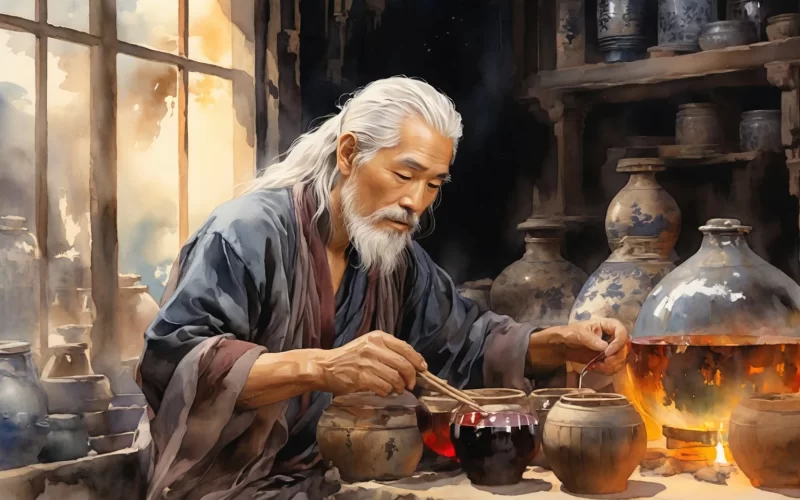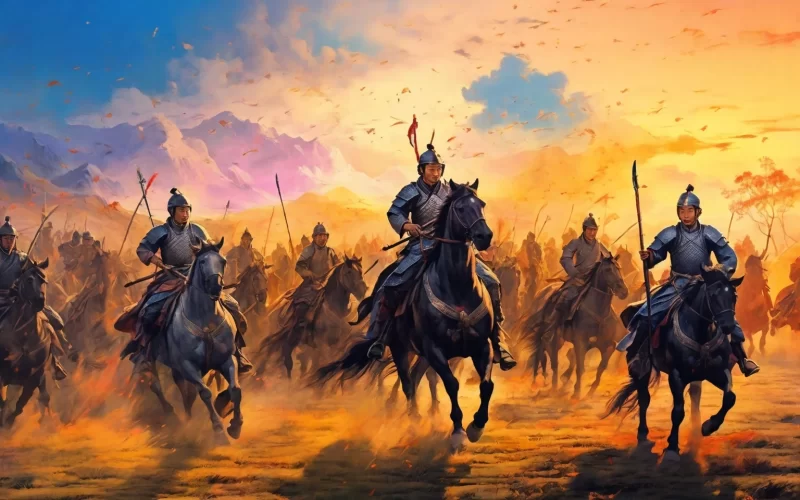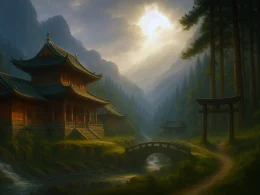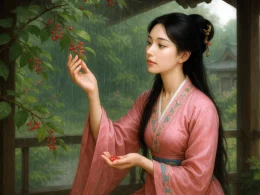Brewer Ji, gone to the Yellow Spring,
Go on brewing your wine there, I suppose!
But in the world of shades there is no Li Bai;
To whom then can you sell your wine, may I ask?
Original Poem
「哭宣城善酿纪叟」
李白
纪叟黄泉里,还应酿老春。
夜台无李白,沽酒与何人?
Interpretation
Composed during Li Bai's later years while residing in Xuancheng, this poem is a heartfelt elegy for Ji Sou, an ordinary master brewer. At a time when Tang dynasty poets commonly composed epitaphs for nobility, Li Bai instead dedicated his most profound verse to a common artisan—an act that itself transcended contemporary social values. The poet elevates his friendship with Ji Sou into a dialogue transcending life and death, centered on the eternal interplay between art (poetry) and craft (brewing).
First Couplet: "纪叟黄泉里,还应酿老春。"
Jì sǒu Huángquán lǐ, hái yīng niàng lǎochūn.
Old Ji Sou, there in the Yellow Springs—Surely you still brew your "Eternal Spring" wine?
The poem opens with an intimate address, "Old Ji Sou," immediately blurring the boundary between the living and the dead as if conversing across realms. "Yellow Springs" typically evokes a cold underworld, yet "surely you still brew" expresses unwavering belief and warm imagination, infusing that silent realm with familiar vitality. This is not rational deduction but emotional necessity—to Li Bai, Ji Sou and his craft are inseparable; his soul could not be altered by death. This stubborn imagination conveys the poet's highest respect and deepest longing.
Second Couplet: "夜台无李白,沽酒与何人?"
Yètái wú Lǐ Bái, gū jiǔ yǔ hé rén?
But in the dark terrace, with no Li Bai there—To whom will you sell your wine?
This couplet is an immortal masterpiece, its emotional logic a stroke of genius. Rather than directly expressing grief, the poet voices an unexpected concern: that Ji Sou's talent might go unappreciated in the afterlife. "No Li Bai there" appears supremely confident yet reveals profound sorrow and loneliness—acknowledging the cruel finality of separation. "To whom will you sell your wine?" elevates the anguish: theirs was not merely a vendor-customer relationship but a unique bond between creator and connoisseur. Li Bai's presence was the ultimate validation of Ji Sou's craft. This question echoes with the loneliness of genius and the void left by a lost soulmate.
Holistic Appreciation
This brief pentasyllabic quatrain, merely twenty characters, constructs a vast spacetime spanning life and death, condensing profound human feeling. It begins with romantic imagination and concludes with a devastatingly realistic question, creating immense emotional tension that pays ultimate tribute to an ordinary yet extraordinary friendship. Transcending conventional elegy, it avoids mournful lamentation, concealing oceanic grief beneath a tone of calm humor. Through his genius, Li Bai elevates personal sorrow into a timeless meditation on soulmates, craft, and the meaning of life.
Artistic Merits
- Masterful Use of Joyful Imagery to Convey Sorrow: The poem depicts the lively scene of brewing and selling wine, embedding the ultimate grief of losing a soulmate within it, making the sorrow more profound and moving.
- Fantastical Ambiance Blending Reality and Illusion: Activities like "brewing Eternal Spring" and "selling wine" unfold in the虚幻 settings of "Yellow Springs" and "dark terrace," perfectly merging reality and imagination, life and death.
- Emotional Impact Through Simple Language: The colloquial, unadorned language seems spoken effortlessly, yet keywords like "surely," "no," and "to whom" carry immense weight, achieving profundity within simplicity.
- Unique Lyrical Perspective Centered on Self: Placing "Li Bai" at the poem's core is not arrogance but a unique emotional logic—my grief stems from our irreplaceable mutual fulfillment, making the expression more direct and powerful.
Insights
This poem reveals the true depth of emotional connection. The most precious friendships are built on mutual recognition and fulfillment of value, transcending status (immortal poet and elderly brewer) and even life itself. Li Bai's grief lies not only in losing a friend but in the collapse of an entire world—one built on the perfect harmony of his poetry and Ji Sou's wine. It reminds us to cherish those who truly understand and fulfill us, for their presence defines the brightest parts of our own value. The poet's equal mourning for a commoner also shows that noble character and deep emotion are never measured by worldly status.
About the poet

Li Bai (李白), 701 - 762 A.D., whose ancestral home was in Gansu, was preceded by Li Guang, a general of the Han Dynasty. Tang poetry is one of the brightest constellations in the history of Chinese literature, and one of the brightest stars is Li Bai.












